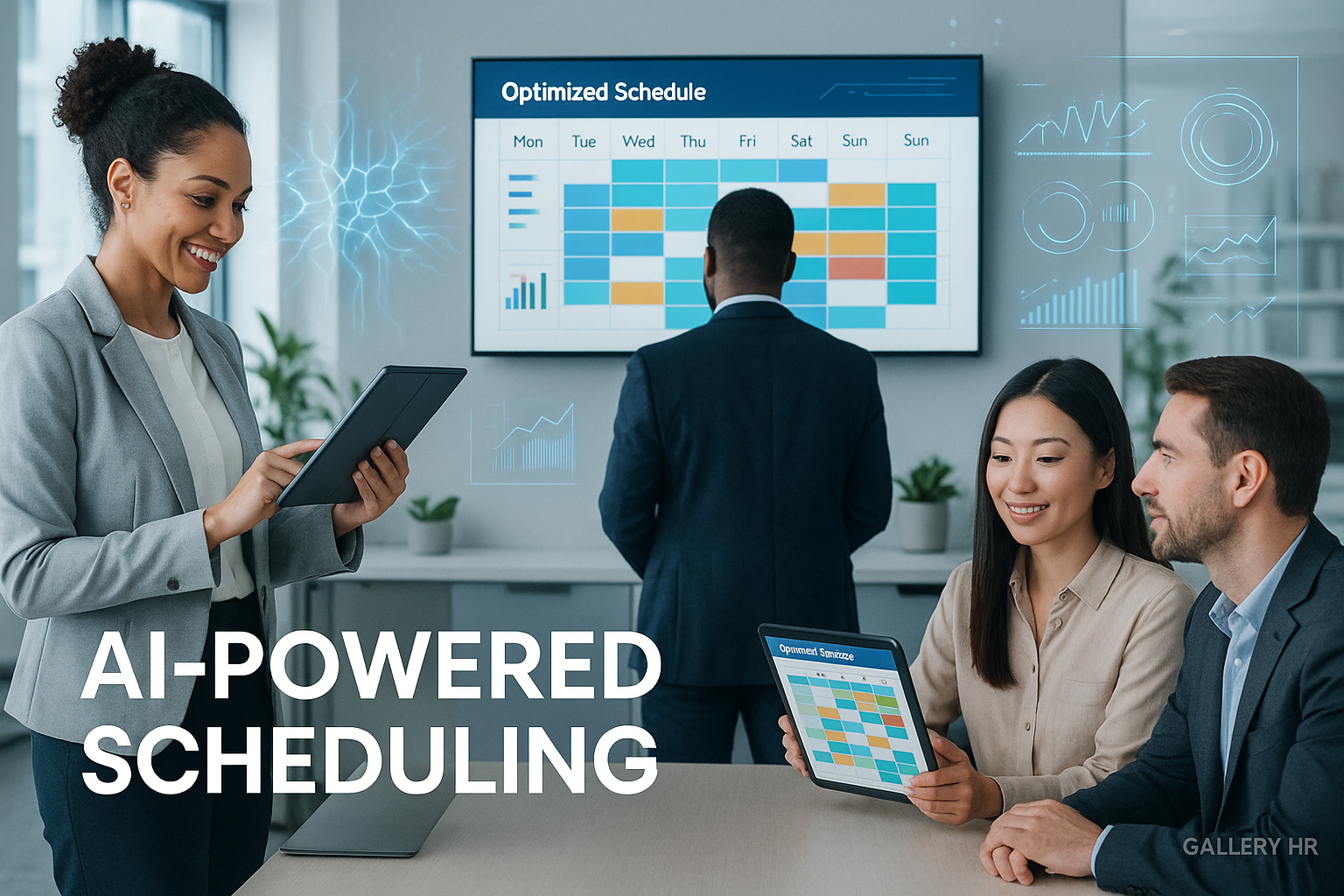سلة التسوق الخاصة بك فارغة
هل لديك حساب بالفعل؟ تسجيل الدخول للتحقق بشكل أسرع.
هل لديك حساب بالفعل؟ تسجيل الدخول للتحقق بشكل أسرع.

Traditional employee scheduling is a complex puzzle involving multiple variables—employee availability, skill requirements, labor costs, and operational demands. What once required hours of manual planning and constant adjustments can now be solved in minutes using GalleryHR's AI-powered scheduling engine that creates optimized rosters while balancing business needs with employee satisfaction.
Manual roster creation presents numerous obstacles for managers:
These challenges multiply in industries with shift work, seasonal demands, or specialized skill requirements.
Machine Learning Algorithms: The AI engine analyzes historical data, employee performance patterns, and operational requirements to generate optimal schedules that balance efficiency with fairness.
Multi-Variable Optimization: The system simultaneously considers employee preferences, skill sets, availability, labor costs, compliance requirements, and business demand patterns to create balanced rosters.
Predictive Analytics: Advanced algorithms forecast staffing needs based on historical trends, seasonal patterns, and business projections, ensuring adequate coverage during peak periods.
Real-Time Adaptability: When unexpected changes occur, the AI instantly recalculates optimal alternatives, minimizing disruption while maintaining operational effectiveness.

Step 1: Data Collection and Analysis The AI engine processes:
Step 2: Intelligent Optimization Advanced algorithms create schedules that:
Step 3: Continuous Learning The system learns from:
"RetailMax Chain" - 500-employee retail operation across 15 locations
Traditional Scheduling Challenges:
AI-Powered Results:
Operational Impact: The company reinvested saved management time into customer service training, resulting in 15% increased sales and improved employee engagement scores.
Skill-Based Matching: The AI automatically assigns employees with appropriate certifications and competencies to specialized tasks, ensuring quality standards while developing employee capabilities.
Demand Forecasting: Machine learning analyzes sales patterns, seasonal trends, and external factors to predict staffing needs with 95% accuracy, preventing both understaffing and overstaffing scenarios.
Fairness Algorithms: The system ensures equitable distribution of preferred shifts, overtime opportunities, and weekend assignments across team members.
Compliance Monitoring: Automated checks prevent scheduling violations related to maximum working hours, minimum rest periods, and industry-specific regulations.
Self-Service Scheduling: Employees access mobile apps to set availability, request shifts, and swap schedules with AI-powered matching to suitable replacements.
Predictable Patterns: AI creates consistent scheduling patterns that help employees plan personal activities while meeting business requirements.
Fair Opportunity Distribution: The system tracks and balances overtime distribution, premium shift assignments, and professional development opportunities across the workforce.
Transparent Communication: Automated notifications keep everyone informed about schedule changes, available shifts, and upcoming assignments.
Healthcare Facilities: AI ensures proper nurse-to-patient ratios while balancing specialized skills across shifts and managing on-call requirements.
Manufacturing Operations: The system optimizes production line staffing based on order volumes, maintenance schedules, and employee certifications.
Retail Environments: Dynamic scheduling adjusts to foot traffic patterns, promotional events, and seasonal demand fluctuations.
Hospitality Industry: AI manages complex scheduling requirements across multiple departments while accommodating variable occupancy rates.

Quantifiable Benefits:

ROI Calculation Example: For a 200-employee organization:
GalleryHR's AI scheduling continuously evolves, incorporating new data sources and learning from organizational patterns. Future enhancements include integration with IoT sensors for real-time demand adjustment, enhanced predictive capabilities for long-term planning, and advanced employee development recommendations based on scheduling patterns.
The AI scheduling system requires minimal setup time and adapts quickly to organizational patterns. Most companies see immediate improvements in schedule quality and significant time savings within the first month of implementation.
AI-powered scheduling represents a fundamental shift from reactive schedule management to proactive workforce optimization. GalleryHR's intelligent scheduling engine doesn't just create rosters—it creates strategic advantages through optimized labor allocation, improved employee satisfaction, and enhanced operational efficiency.
The future of workforce management is here, powered by AI that thinks strategically, adapts continuously, and delivers results that benefit both business objectives and employee wellbeing. With GalleryHR, smarter scheduling isn't just a possibility—it's a competitive necessity.

Don’t miss this opportunity to upgrade your HR operations and join the growing list of businesses in Sri Lanka achieving success with GalleryHR.
GalleryHR is committed to helping Sri Lankan businesses thrive with smarter, more efficient HR solutions. Partner with us today and experience the difference.
Join our empire today!































0 تعليقات